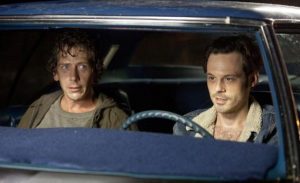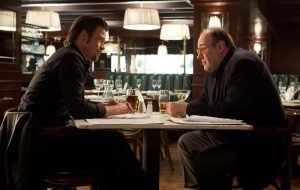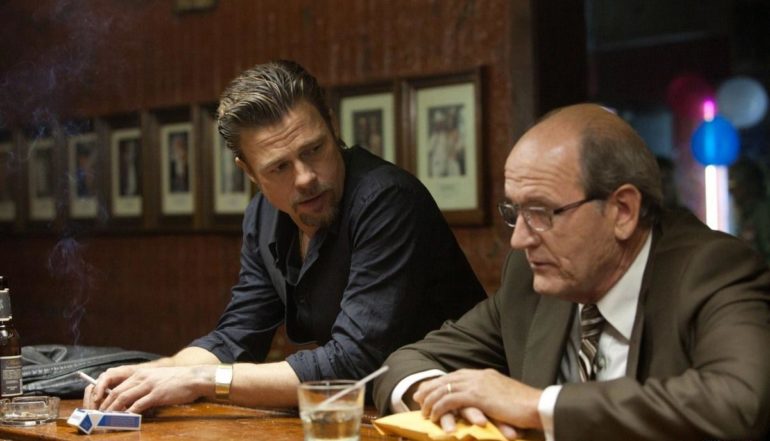If you haven’t been living under a rock, you may have noticed that the 2016 U.S. Presidential Election comes surrounded by a thick cloud of cynicism. It’s not surprising; after all, the main parties have selected the most unpopular set of candidates imaginable (at least, statistically speaking). However, we tend to forget that any candidate can be met with distrust, even someone as idealistic and idealised as the outgoing president, Barack Obama. Killing Them Softly is a brutal, upfront puncturing of such idealism. Given the candidates between whom Americans must now choose, the film’s cynicism can’t help but feel a little ahead of its time.
Upon its release in 2012, Andrew Dominik’s film won praise from some (but not all) quarters for managing to manipulate gangster genre tropes into a compellingly blatant here-and-now commentary. Adapted from George V. Higgins’ novel Cogan’s Trade, a tale of gangsters cleaning up the messes that result when a mob card game is opportunistically robbed is solid moviemaking material, if hardly revelatory in the long history of mob flicks. Updating the 1974 novel to 2008, Dominik’s script sets the action in the runup to the U.S. Presidential election, as the Bush administration attempts to shore up the economy following the banking collapse. In all of this, it’s easy to observe the commentary being elevated from subtext to the level of text, but the mob trappings also allow Dominik to bring a great deal of cynicism to proceedings. In Killing Them Softly, there’s no honour among thieves, be they bank robbers or banks.

Critics of Killing Them Softly can and do describe the film as obvious in its themes. It’s true; the film is brazen, but the times in which it is set seem to demand this blatancy. The opening of the film sees weasley two-bit hood Frankie (Scoot McNairy) emerge from a cavernous doorway into a windswept, litter-strewn parking lot bathed in jaundiced sunlight. Above the parking lot looms a sign, displaying two election posters side by side. One blares ‘McCain’, with the Arizona senator giving two thumbs up. The other simply shows Barack Obama’s smiling face next to the word ‘Change’. In no small part, the election of Obama as president was based on the simplicity of that idea of change; a man’s principles and policies encapsulated in one word. Killing Them Softly takes a similar tack vis-a-vis the financial instability that came to define that year. It takes the various individuals, decisions and consequences and distills them into a simple story of double-crossing crooks. There are few explanations of the film that don’t sound on the nose, but it’s this upfront approach that Dominik turns to his advantage. As Hillary Clinton and Donald Trump attempt to capitalize on each other’s indiscretions, one can’t help but be reminded of the big tar brush Killing Them Softly brandishes with abandon
Dominik’s film could never have lived up to the hype of following The Assassination of Jesse James By The Coward Robert Ford, but it steps out of that film’s shadow on its own merit, and thanks to its very different sensibilities. It’s an hour shorter than Assassination… and, even compared to that most elegant takedown of an American myth, even more distrustful of the tall tales men spin. Killing Them Softly is a film populated by lowlifes and slick operators, and Dominik’s approach is to equate the bankers, analysts and policymakers mired in the economic crash with this group of louses. Frankie and his partner Russell (Ben Mendelsohn, never slimier or better) get wind of a card game being organized by mobster Markie Trattmann (Ray Liotta) that’s ripe for robbing. It’s only ripe because a similar game was robbed once before, and it later turned out Markie was behind it. If he’s hit again, all will assume he did it and he’ll be forced to take the blame. All this is explained to Frankie by Johnny Amato, a low-ranking mobster played by Vincent Curatola. Perched in a poky brown office, behind a desk with an old computer, Amato is a long way from Curatola’s performance as Johnny Sack in The Sopranos. Even in orange prison overalls, Sack carried himself with dignity and menace. Here, Amato is a low-level schlub in beige polo shirts surrounded by mounds of paperwork. Even criminals have to keep their books and tease out their plans. The seductive style of the mob is painfully absent.
Most of Killing Them Softly centres on discussion, be it of murder, home lives or bargaining. Dominik demystifies this mob by reducing it to the pettiness of everyday business speak and sniping. The characters are constantly threatening and goading each other into poor decisions. This would explain the presence of Russell in all of this. A greasy heroin addict, he’s a wild card waiting to bring down the house. When he and Frankie arrange to rob Trattmann’s game, he’s tasked with bringing the necessary supplies. Thus, they end up robbing the game whilst wearing yellow dishwashing gloves and brandishing a sawn-off shotgun that’s had a bit too much sawn off for comfort. While the robbery unfolds, a television in a corner of the dank game room broadcasts George W. Bush announcing his economic stimulus package. A rumour persisted that a political speech can be heard (even faintly) in every scene of the film. It’s untrue, though speeches by Bush, the then-Treasury secretary Henry Paulson, and then-senator/presidential candidate Barack Obama pepper the action. Indeed, Obama’s victory speech bookends the film. In the opening sequence, Obama’s voice can be heard on the soundtrack before the screen cuts harshly to white-on-black credits accompanied by the harsh electronica stylings of Carl Stone’s ‘Moon Dance’. It’s a piece of music that would be more at home in a horror film, but then Killing Them Softly is a film predicated on its horrors, economic and otherwise.
Despite lacking so many of the trappings of the gangster genre, Killing Them Softly matches its genre brethren in its violence and bleak outlook. This is a film that sees little hope for any of its characters, but it goes to great lengths to stress that they may not deserve hope. Russell and Frankie are opportunistic thieves, looking for ways to escape their dismal lots in life. Russell can do himself few favours, though; his heroin addiction has left him desperately negligent, unable even to wash himself properly. His only hopes are the next score and the possibility of a meeting with a prostitute. (A brilliantly gutsy moment sees him shooting up to the opening strains of Velvet Underground’s ‘Heroin’. Much like the rest of the film, it just stops short of saying the exact word to make its point). The aftermath for Trattmann (A brilliant Liotta, playing him like a wimpier Henry Hill whose schnook cover has been blown) sees him receiving a protracted beating from a couple of heavies. The beating sequence encapsulates Killing Them Softly’s aesthetic. The night rainstorm setting lends the moment a dark, cool look (The film’s unsung hero is DoP Greig Fraser), but then Trattmann takes blow after blow to the face, and suddenly it’s not so pretty anymore. His nose spurts blood, and a dig to the solar plexus causes him to vomit. There’s little respite from this aggression to be found in the film. The only female speaking part is a prostitute who gets three lines, while the appearance of Petula Clark’s rendition of ‘Windmills Of Your Mind’ on the soundtrack is a momentary balm.

Glamour is in short supply; most of what there is comes from Brad Pitt. The movie star’s movie star gives a riveting turn as Jackie Cogan, a mob hitman tasked with cleaning up the aftermath of the robbery. His stylings, from his slicked-back hair to his slick black Oldsmobile, paint Cogan as the most commanding and controlling presence in the film. He’s a regulator on a salvage mission stepping into the detritus, a grim reaper in a leather jacket. He can only look on in exasperation as all and sundry around him struggle to sort out the mess. His liaison with the mob’s upper echelons, the pragmatically timid Driver (Richard Jenkins), is forever contemplating the problems with Cogan’s suggested courses of action. Meanwhile, Cogan hires an outside hitman, James Gandolfini’s Mickey, to perform one killing, but his bitter brand of self-pity and an over-fondness for liquor leave the job going undone. It’s a testament to the late Gandolfini’s talents that he brings palpable sadness to such a repulsive character. His treatment of all around him (including the aforementioned prostitute) is repellent but, like most everyone here, he’s damaged goods, with most of that damage inflicted by his own hand.
Besides being good actors, the casting of Curatola and Gandolfini in Killing Them Softly is an active reminder of, and contrast to, The Sopranos. Despite his vulnerabilities, Tony Soprano rarely felt like he wasn’t in charge. In Killing Them Softly, Cogan is standing over an array of headless chickens. As the film draws to a close, and he and Driver sit at a bar, Cogan can only roll his eyes as the president-elect extols the American virtues of togetherness and unity. “He wants to tell me we’re living in a community?”, he asks, “Don’t make me laugh.” Besides having just committed two murders in the preceding scenes, Cogan has seen through enough speeches and posturing in his career (and this film) to believe these words. In an exceedingly bitter final speech (delivered with quiet relish by Pitt), Cogan dismisses this president and excoriates the memory of Thomas Jefferson for blatant hypocrisy. You could imagine Cogan seeing through Trump’s hot air, though Cogan’s assertion that “America’s not a country. It’s just a business.”, could help explain how the New York businessman even got this far. Create enough cynicism, and anyone armed with a quick answer and their own mythos can get far. Dominik and his film are dismissive of myths; reality may just be a little too real for myths to infiltrate.

